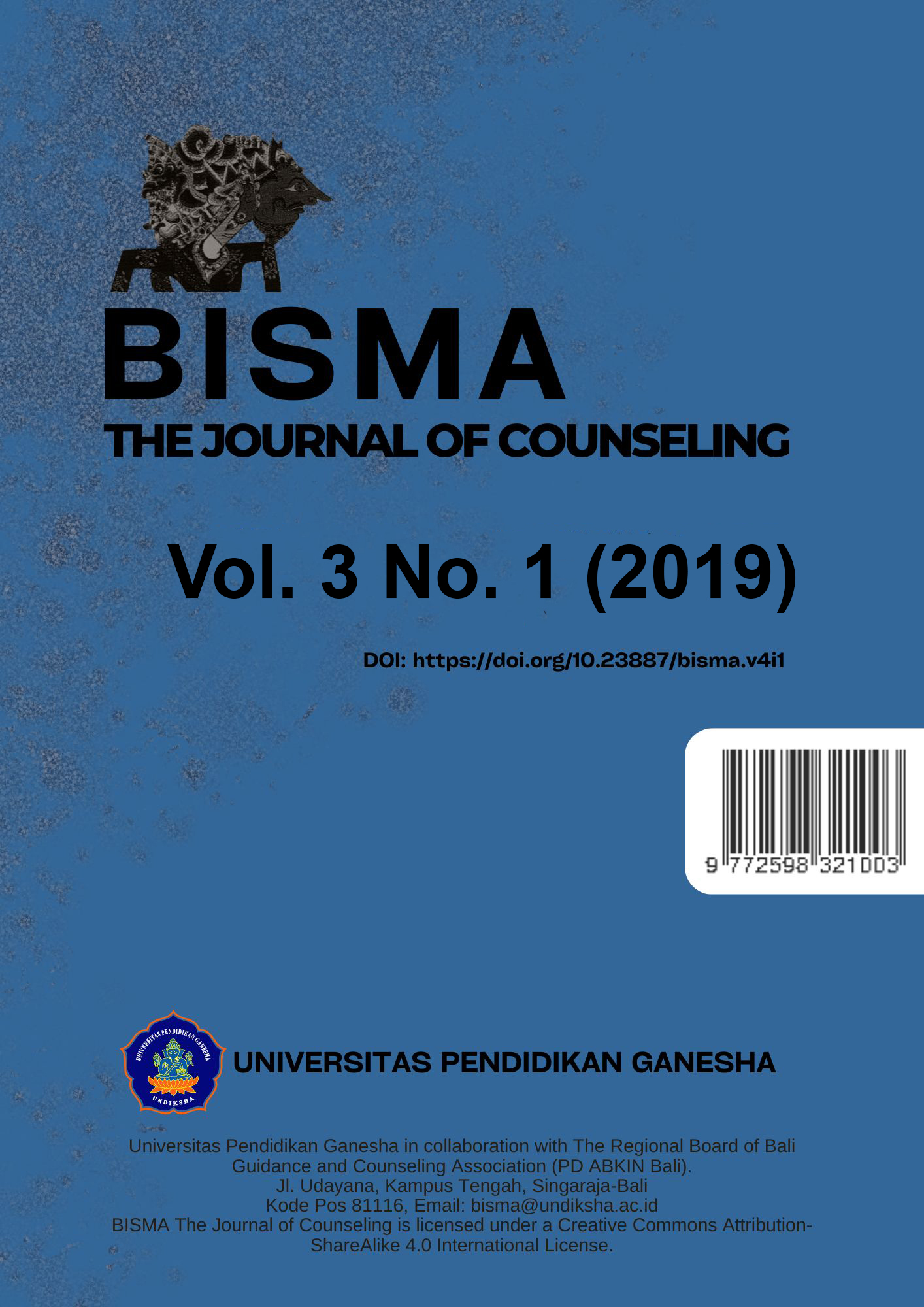Effectiveness of Modeling Techniques on Self Exhibition of Student of Laboratorium Undiksha High School
DOI:
https://doi.org/10.23887/bisma.v3i1.18235Keywords:
Cognitive Counseling, Modeling Techniques, self-exhibitionAbstract
This study aims to know: The effectiveness of cognitive counseling with lesson study modeling techniques for student self exhibition. Experimental Research using Pretest Postest Control Group Design. The study population was class X students of the Undiksha Lab High School Singaraja Buleleng Bali. Through random sampling technique, a sample of 45 students (male 22, female 23, average age 15 years) was obtained. 22 students were placed in the Experiment group who received cognitive counseling treatment with modeling techniques and 23 students in the control group without treatment. The research data was collected by the Self Exhibition questionnaire. The research data was analyzed by differential t-test and continued in Cohen to calculate the effectiveness of using the JASP0 program. 10.0.0 for Windows. The results of the analysis show 1) the value of p = 0.01, significant at 0.01> 0.05 2) Effect size of 1.894 categorized as high. This means that there are significant differences in the value of students given cognitive counseling treatment with modeling techniques. Students who are given treatment are more self exhibition compared to students without treatment. So cognitive counseling with effective modeling techniques to improve Self Exhibition, so that cognitive counseling with modeling techniques can be used as an alternative choice by counselors to improve Self exhibition.
References
Angganantyo, W. (2014). Coping Religius Pada Karyawan Muslim Ditinjau Dari Tipe Kepribadian. Jurnal Ilmiah Psikologi Terapan, 2(1), 50–61. https://doi.org/10.22219/JIPT.V2I1.1769
Anna-kaarina, G., & Pirjo, M. (2011). Työpajan merkitys oppimisessa. Retrieved from https://www.theseus.fi/bitstream/handle/10024/29238/Gardemeister_Miikki.pdf?sequence=2&isAllowed=y
Anthony, W. A. (1993). Recovery from mental illness: The guiding vision of the mental health service system in the 1990s. Psychosocial Rehabilitation Journal, 16(4), 11–23. https://doi.org/10.1037/h0095655
Dharsana, K. (2013). Teori-Teori Konseling (Diktat). Singaraja: Jurusan Bimbingan Konseling Fakultas Ilmu Pendidikan Universitas Pendidikan Ganesha.
Dharsana, K. (2014). Model-Model Teori, Teknik, Skill Bimbingan Konseling. Singaraja: Jurusan Bimbingan Konseling Fakultas Ilmu Pendidikan Universitas Pendidikan Ganesha.
Ni Putu Desiawati, Kadek Suranata, I. K. D. (2014). Penerapan Konseling Kognitif Sosial Dengan Teknik Modeling Untuk Meningkatkan Etika Sosial Pada Siswa Kelas Xi C Ap Smk Negeri 1 Singaraja. E-Journal Undiksa Jurusan Bimbingan Konseling, 2(1). Retrieved from https://ejournal.undiksha.ac.id/index.php/JJBK/article/view/3793
Prof. Dr. I Ketut Dharsana, M. P. . (2017). RPBK (2nd ed.). Singaraja: BK FIP UNDIKSHA.
Sedanayasa, G. (2009). Dasar-dasar Bimbingan Konseling. Singaraja: Jurusan Bimbingan Konseling Fakultas Ilmu Pendidikan Universitas Pendidikan Ganesha.








